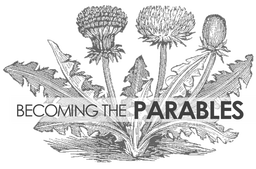 'Becoming Parables' The stories Jesus told were meant to unsettle his listeners. C. H. Dodd defines a parable as 'a metaphor or simile drawn from nature or common life, arresting the hearer by its vividness or strangeness, and leaving the mind in sufficient doubt about its precise application to tease it into active thought.' As you read the parable of the unforgiving servant what struck you? Surprised you? What was vivid or strange? How does the story challenge or widen or deepen your faith? We live in a very different context from Jesus. Stories about shepherds and farming are distant, almost mythic. Can you imagine a contemporary setting for the story Jesus told (for example, 'the Kingdom of God is like riding a Trimet bus ... or going to Pioneer Courthouse Square ...'). Feel free to post a response to the parable or to the sermon. I'd be glad to know how the stories Jesus told have teased your mind 'into active thought.' Peace to you, Rod Stafford Matthew 18: 23-35
For this reason the kingdom of heaven may be compared to a king who wished to settle accounts with his slaves.When he began the reckoning, one who owed him ten thousand talents was brought to him; and, as he could not pay, his lord ordered him to be sold, together with his wife and children and all his possessions, and payment to be made. So the slave fell on his knees before him, saying, “Have patience with me, and I will pay you everything.”And out of pity for him, the lord of that slave released him and forgave him the debt. But that same slave, as he went out, came upon one of his fellow-slaves who owed him a hundred denarii; and seizing him by the throat, he said, “Pay what you owe.” Then his fellow-slave fell down and pleaded with him, “Have patience with me, and I will pay you.” But he refused; then he went and threw him into prison until he should pay the debt. When his fellow-slaves saw what had happened, they were greatly distressed, and they went and reported to their lord all that had taken place. Then his lord summoned him and said to him, “You wicked slave! I forgave you all that debt because you pleaded with me. Should you not have had mercy on your fellow-slave, as I had mercy on you?” And in anger his lord handed him over to be tortured until he should pay his entire debt. So my heavenly Father will also do to every one of you, if you do not forgive your brother or sisterfrom your heart.’
0 Comments
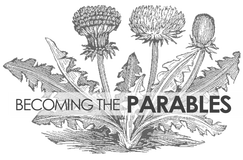 'Becoming Parables' The stories Jesus told were meant to unsettle his listeners. C. H. Dodd defines a parable as 'a metaphor or simile drawn from nature or common life, arresting the hearer by its vividness or strangeness, and leaving the mind in sufficient doubt about its precise application to tease it into active thought.' As you read the parable of the fig tree what struck you? Surprised you? What was vivid or strange? How does the story challenge or widen or deepen your faith? We live in a very different context from Jesus. Stories about shepherds and farming are distant, almost mythic. Can you imagine a contemporary setting for the story Jesus told (for example, 'the Kingdom of God is like riding a Trimet bus ... or going to Pioneer Courthouse Square ...'). Feel free to post a response to the parable or to the sermon. I'd be glad to know how the stories Jesus told have teased your mind 'into active thought.' Peace to you, Rod Stafford The Parable of the Barren Fig Tree / Luke 13: 6-9
Then he told this parable: ‘A man had a fig tree planted in his vineyard; and he came looking for fruit on it and found none. So he said to the gardener, “See here! For three years I have come looking for fruit on this fig tree, and still I find none. Cut it down! Why should it be wasting the soil?” He replied, “Sir, let it alone for one more year, until I dig round it and put manure on it. If it bears fruit next year, well and good; but if not, you can cut it down.” ’ 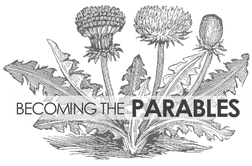 'Becoming Parables' The stories Jesus told were meant to unsettle his listeners. C. H. Dodd defines a parable as 'a metaphor or simile drawn from nature or common life, arresting the hearer by its vividness or strangeness, and leaving the mind in sufficient doubt about its precise application to tease it into active thought.' As you read the parable of the dishonest manager what struck you? Surprised you? What was vivid or strange? How does the story challenge or widen or deepen your faith? We live in a very different context from Jesus. Stories about shepherds and farming are distant, almost mythic. Can you imagine a contemporary setting for the story Jesus told (for example, 'the Kingdom of God is like riding a Trimet bus ... or going to Pioneer Courthouse Square ...'). Feel free to post a response to the parable or to the sermon. I'd be glad to know how the stories Jesus told have teased your mind 'into active thought.' Peace to you, Rod Stafford Luke 31.1-8a
Then Jesus said to the disciples, ‘There was a rich man who had a manager, and charges were brought to him that this man was squandering his property. So he summoned him and said to him, “What is this that I hear about you? Give me an account of your management, because you cannot be my manager any longer.” Then the manager said to himself, “What will I do, now that my master is taking the position away from me? I am not strong enough to dig, and I am ashamed to beg. I have decided what to do so that, when I am dismissed as manager, people may welcome me into their homes.” So, summoning his master’s debtors one by one, he asked the first, “How much do you owe my master?” He answered, “A hundred jugs of olive oil.” He said to him, “Take your bill, sit down quickly, and make it fifty.” Then he asked another, “And how much do you owe?” He replied, “A hundred containers of wheat.” He said to him, “Take your bill and make it eighty.” And his master commended the dishonest manager because he had acted shrewdly. 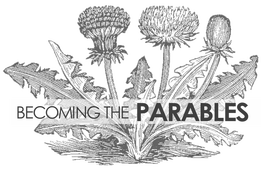 'Becoming Parables' The stories Jesus told were meant to unsettle his listeners. C. H. Dodd defines a parable as 'a metaphor or simile drawn from nature or common life, arresting the hearer by its vividness or strangeness, and leaving the mind in sufficient doubt about its precise application to tease it into active thought.' As you read the Parable of the thistles in the field what struck you? Surprised you? What was vivid or strange? How does the story challenge or widen or deepen your faith? We live in a very different context from Jesus. Stories about shepherds and farming are distant, almost mythic. Can you imagine a contemporary setting for the story Jesus told (for example, 'the Kingdom of God is like riding a Trimet bus ... or going to Pioneer Courthouse Square ...'). Feel free to post a response to the parable or to the sermon. I'd be glad to know how the stories Jesus told have teased your mind 'into active thought.' Peace to you, Rod Stafford Matthew 25.1-13
‘Then the kingdom of heaven will be like this. Ten bridesmaids took their lamps and went to meet the bridegroom. Five of them were foolish, and five werewise. When the foolish took their lamps, they took no oil withthem; but the wise took flasks of oil with their lamps. As the bridegroom was delayed, all of them became drowsy and slept. But at midnight there was a shout, “Look! Here is the bridegroom! Come out to meet him.” Then all those bridesmaids got up and trimmed their lamps. The foolish said to the wise, “Give us some of your oil, for our lamps are going out.” But the wise replied, “No! There will not be enough for you and for us; you had better go to the dealers and buy some for yourselves.” And while they went to buy it, the bridegroom came, and those who were ready went with him into the wedding banquet; and the door was shut. Later the other bridesmaids came also, saying, “Lord, lord, open to us.” But he replied, “Truly I tell you, I do not know you.” Keep awake therefore, for you know neither the day nor the hour. 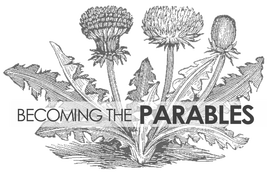 'Becoming Parables' The stories Jesus told were meant to unsettle his listeners. C. H. Dodd defines a parable as 'a metaphor or simile drawn from nature or common life, arresting the hearer by its vividness or strangeness, and leaving the mind in sufficient doubt about its precise application to tease it into active thought.' As you read the Parable of the thistles in the field what struck you? Surprised you? What was vivid or strange? How does the story challenge or widen or deepen your faith? We live in a very different context from Jesus. Stories about shepherds and farming are distant, almost mythic. Can you imagine a contemporary setting for the story Jesus told (for example, 'the Kingdom of God is like riding a Trimet bus ... or going to Pioneer Courthouse Square ...'). Feel free to post a response to the parable or to the sermon. I'd be glad to know how the stories Jesus told have teased your mind 'into active thought.' Peace to you, Rod Stafford Matthew 13:24-30
He told another story. "God's kingdom is like a farmer who planted good seed in his field. That night, while his hired men were asleep, his enemy sowed thistles all through the wheat and slipped away before dawn. When the first green shoots appeared and the grain began to form, the thistles showed up, too. "The farmhands came to the farmer and said, 'Master, that was clean seed you planted, wasn't it? Where did these thistles come from?' "He answered, 'Some enemy did this.' "The farmhands asked, 'Should we weed out the thistles?' "He said, 'No, if you weed the thistles, you'll pull up the wheat, too. Let them grow together until harvest time. Then I'll instruct the harvesters to pull up the thistles and tie them in bundles for the fire, then gather the wheat and put it in the barn.'" Matthew 13:36-43 Jesus dismissed the congregation and went into the house. His disciples came in and said, "Explain to us that story of the thistles in the field." So he explained. "The farmer who sows the pure seed is the Son of Man. The field is the world, the pure seeds are subjects of the kingdom, the thistles are subjects of the Devil, and the enemy who sows them is the Devil. The harvest is the end of the age, the curtain of history. The harvest hands are angels. "The picture of thistles pulled up and burned is a scene from the final act. The Son of Man will send his angels, weed out the thistles from his kingdom, pitch them in the trash, and be done with them. They are going to complain to high heaven, but nobody is going to listen. At the same time, ripe, holy lives will mature and adorn the kingdom of their Father. "Are you listening to this? Really listening?” |
Archives
July 2024
Categories
All
|

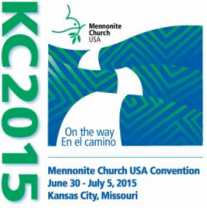

 RSS Feed
RSS Feed
